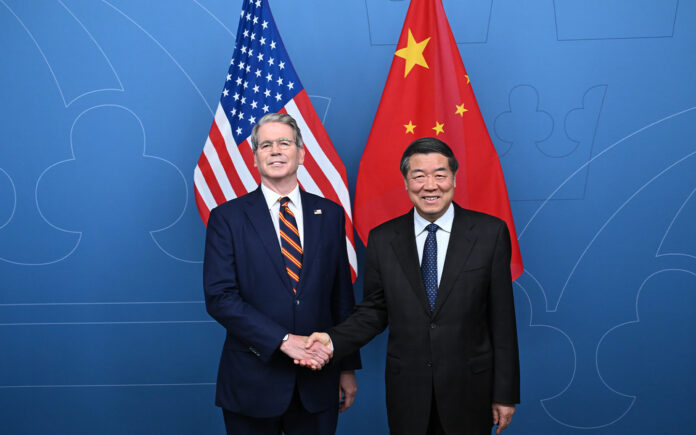Top U.S. and Chinese officials met in Stockholm on Monday for more than five hours to continue trade talks, aiming to extend a truce for another 90 days ahead of an August 12 deadline.
The meeting follows recent preliminary deals in May and June that helped ease tensions between the two countries.
U.S. Treasury Chief Scott Bessent and China’s Vice Premier He Lifeng took part in the closed-door talks at the Swedish prime minister’s office. Officials left the venue around 8 p.m. local time without speaking to reporters.
Talks are expected to resume on Tuesday.
Without a new agreement, U.S. tariffs on Chinese goods could return to triple-digit levels, disrupting supply chains and global trade. Bessent has said the U.S. wants China to shift its economy more toward domestic consumption and reduce dependence on exports.
President Trump briefly addressed the talks during a press conference in Scotland with U.K. Prime Minister Keir Starmer, saying he would like China to open its market further.
U.S. Trade Representative Jamieson Greer, who attended the Stockholm talks, said the meetings were focused on tracking the progress of current agreements and ensuring the flow of key minerals between both countries.
The U.S. recently signed a trade deal with the European Union involving a 15% tariff on most EU goods. A similar deal with China remains under discussion.
The Biden administration has paused restrictions on some tech exports to China to avoid disrupting the negotiations and to support planning for a possible meeting between Trump and Chinese President Xi Jinping later this year.
In Washington, lawmakers plan to introduce bills this week targeting China’s policies on Taiwan, minority groups, and dissidents. These developments could affect the progress of talks.
Taiwan President Lai Ching-te is expected to delay a proposed August trip to the U.S. to avoid upsetting Beijing during sensitive negotiations.
Previous rounds of U.S.-China trade talks in Geneva and London focused on lowering tariffs and restarting the flow of rare earth minerals and tech products that had been restricted. The deeper issues in the dispute, such as U.S. complaints about China’s export-driven model and China’s concerns over U.S. tech export controls, have yet to be resolved.




